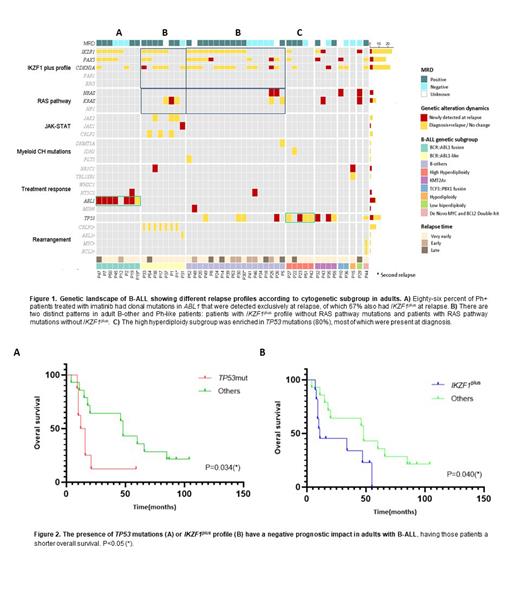Introduction: Adult B-cell precursor acute lymphoblastic leukemia (BCP-ALL) is a hematologic malignancy characterized by a high genetic heterogeneity and high relapse rate. Despite treatment advances have led to high cure rates in pediatric BCP-ALL (90%), improving survival in adults remains a challenge. Identification of genetic alterations driving relapse and both new prognostic and therapeutic biomarkers are important to improve survival in adults with BCP-ALL.
Aim: To identify genetic alterations that lead to relapse in adult BCP-ALL patients (18-72 years) based on the tumor genetic landscape.
Methods: Forty-five adult BCP-ALL patients (median age: 43 years; range 18-72 years) were studied at diagnosis and relapse by massive sequencing using a custom panel that allows detection of single nucleotide variants (SNVs) and insertions/deletions (INDELs) in 150 genes involved in BCP-ALL, in addition to copy number variations (CNVs), gene fusions and aneuploidy. Thirty-eight percent of patients belonged to the BCP-other ALL group, 16% were Philadelphia-positive (Ph+), 16% were classified as Philadelphia-like (Ph-like), 11% belonged to the high hyperdiploidy group, 8% had KMT2A rearrangements ( KMT2Ar), 4% TCF3::PBX1 fusion, 3% showed hypodiploidy, 2% low hyperdiploidy and 2% de novo MYC and BCL2 double-hit. Patients were treated according to the Spanish Adult-PETHEMA high-risk ALL protocols.
Results: The most frequently deleted gene at diagnosis was IKZF1 (25/45, 56%). Among these cases, 72% (20/25) had IKZF1plus genetic profile, characterized by co-occurrence of IKZF1 deletions with at least one deletion in CDKN2A/B, PAX5 or PAR1, without ERG deletion. The IKZF1plus genetic profile was associated with specific genetic subgroups: Ph+ (5/7, 71%), Ph-like (5/7, 71%) and B-other (10/17, 59%). Moreover, it was significantly related with the presence of minimal/measurable residual disease (MRD) after induction (16/18, 89%) p < 0.001 and persistence at relapse in most patients (18/20, 90%; p < 0.001). Interestingly, among those 5 patients initially diagnosed with IKZF1 deletion but who did not meet the criteria for the IKZF1plus profile, 2 of them acquired the IKZF1plus profile at relapse. This suggests a possible cooperation of these genetic deletions contributing to therapy resistance and disease progression in these genetic subgroups. Eighty-six percent (6/7) of Ph+ patients who received imatinib treatment presented ABL1 mutations that were detected exclusively at relapse. Of these cases, 67% (4/6) were also associated with IKZF1plus at relapse (Figure 1A).
Two mutually exclusive genetic patterns were identified at relapse in adult B-other and Ph-like patients. Thus, patients with IKZF1plus profile did not show RAS pathway mutations (59% and 57%, respectively), while patients with RAS pathway mutations lack in IKZF1plus profile (18% and 29%, respectively) (Figure 1B). Moreover age-related differences in the adult B-other ALL patient group were observed. The presence of mutations in RAS pathway was associated with younger age (<40 years) (3/10, 30% vs. 0/7, 0%), whereas older patients (≥40 years) predominated in the IKZF1plus profile (6/7, 86% vs. 3/10, 30%).
TP53 alterations were detected at diagnosis and/or relapse in 11 patients (24%), most of which (9/11, 82%) had a heterozygous mutation plus a deletion or a homozygous mutation (double-hit). The high hyperdiploidy subgroup was enriched in TP53 mutations (4/5, 80%), most of which were already present at diagnosis (3/4, 75%). These findings indicate that genetic biomarkers usually linked to a favorable prognosis, such as high hyperdiploidy, can be associated with unfavorable genetic markers, leading to poorer outcomes in this group of patients (Figure 1C). Both the IKZF1plus profile and TP53 alterations were associated with poorer overall survival (OS) rates (P=0.034 and P=0.040, respectively) in adult BCP-ALL (Figure 2).
Conclusion: Our results highlight the clinical importance of the TP53 alterations and the IKZF1plus profile as prognostic factors in adult BCP-ALL, suggesting they might help guiding more personalized therapeutic strategies to improve outcomes in this group of BCP-ALL patients.
Grants: SACYL(GRS2386/A/21,GRS2385/A/21,GRS2527/A/22,GRS2506/A/22), JCyL SA118P20, FMM21/002 AP176752021, Pfizer 69383919.
Disclosures
Ribera:Takeda: Consultancy; Novartis: Consultancy; Incyte: Consultancy, Research Funding; AMGEN: Research Funding; Bristol Myers Squibb: Consultancy; Pfizer: Consultancy, Research Funding. Hernández-Rivas:Novartis: Honoraria, Membership on an entity's Board of Directors or advisory committees, Research Funding; Celgene/BMS: Honoraria, Membership on an entity's Board of Directors or advisory committees, Research Funding; Pfizer: Honoraria, Membership on an entity's Board of Directors or advisory committees, Research Funding; Amgen: Honoraria, Membership on an entity's Board of Directors or advisory committees, Speakers Bureau; GSK: Consultancy, Honoraria, Speakers Bureau.


This feature is available to Subscribers Only
Sign In or Create an Account Close Modal